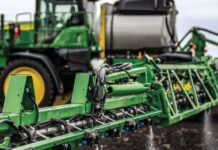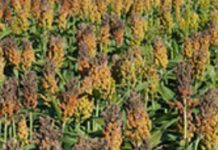From the Office of Public Affairs | http://www.news.ku.edu
Headlines
Researchers land NIH grant to boost testing, vaccination for women leaving incarceration
LAWRENCE — Researchers at the University of Kansas and KU Medical Center have received a $2.5 million grant from the National Institutes of Health to develop and refine an intervention to boost testing and vaccination — and knowledge about both — among one of the country’s most vulnerable populations, women leaving incarceration. The research team is working with cohorts of women leaving incarceration in multiple regions, including the Greater Kansas City area.
Kansas Geological Survey to study social, environmental factors of successful groundwater conservation programs
LAWRENCE — Researchers at the Kansas Geological Survey at the University of Kansas have teamed with colleagues at three other institutions to investigate what makes some groundwater conservation programs more effective than others. The project, funded by $1.6 million from the National Science Foundation, focuses on two regions where irrigators have come together to design their own groundwater conservation programs, one in the San Luis Valley in southern Colorado and the other in Sheridan County in northwest Kansas.
Experts advancing research on crustaceans, coronaviruses and drug design receive KU achievement awards
LAWRENCE — University of Kansas researchers increasing understanding of crustaceans, coronaviruses and drug design have received this year’s Steven F. Warren Research Achievement Award and the KU Research Staff & Postdoctoral Achievement Awards. The annual awards recognize outstanding unclassified academic staff, unclassified professional staff and postdoctoral fellows whose research has significantly influenced their fields and expanded intellectual or societal insights.
Full stories below.
————————————————————————
Contact: Mike Krings, KU News Service, 785-864-8860, [email protected], @MikeKrings
Researchers land NIH grant to boost testing, vaccination for women leaving incarceration
LAWRENCE — As the omicron variant of COVID-19 rages across the United States and around the world, testing and vaccination are as crucial as ever. Researchers at the University of Kansas and KU Medical Center have received a $2.5 million grant from the National Institutes of Health to develop and refine an intervention to boost testing and vaccination — and knowledge about both — among one of the country’s most vulnerable populations, women leaving incarceration.
The project was funded by the NIH’s RADx-UP (underserved populations) initiative. The intervention will be tailored to address the attitudes, knowledge and beliefs of women leaving jail and transitioning back to society, and it will be delivered via infrastructure the team has already developed as part of a previous NIH award. This approach will allow for rapid development and delivery of information tailored for this specific underserved population that can also be scaled up for broader use across the country.
“When we applied for the grant, we were in an environment in which we were strongly encouraging vaccination. At the time we wrote the grant, we were seeing about 50 percent vaccinated in this population, and the percentage in the larger United States was about the same,” said Megha Ramaswamy, professor of population health at KU Medical Center and a co-principal investigator of the grant. “We thought testing would continue to be important, and with the emergence of the omicron variant, it is showing to be very much so. Screening is the bread and butter of the public health world.”
The research team is working with cohorts of women leaving incarceration in Kansas City, Kansas, and Kansas City, Missouri; Oakland, California; and Birmingham, Alabama. They are also collaborating with local partners at each location who are facilitating work with the more than 500 women in the cohort and area correctional facilities and community organizations.
Previously, Ramaswamy and colleagues have developed a program called SHE Women that delivers online education modules on the topics of sexually transmitted infections, cervical cancer, reproductive planning and breast health. The co-principal investigator of the current award, Mugur Geana, is an associate professor of strategic communication at KU and is also director of KU’s Center for Excellence in Health Communications to Underserved Populations, a partner in the project.
That groundwork will enable the researchers to use the experience and partnerships they’ve developed to deliver education to boost knowledge about testing and vaccination for this specific population in a timely fashion but also set the stage for expansion beyond the sites in Kansas City, Oakland and Birmingham.
“This could easily become a nationwide resource. One of the advantages of the system is it is extremely flexible, scalable and easy to update, which is of utmost importance with evolving topics such as the COVID-19 pandemic ” Geana said. “It can easily be adapted for other underserved populations as well. The content is modular and can be directed specifically to various audiences.”
In phase one of the project, researchers are gathering information about the population’s knowledge about COVID-19, testing and vaccination. The team has published previous research about women leaving incarceration’s vaccine hesitancy, knowledge of screening and also found the approximately 1.3 million women under criminal legal supervision face a number of structural challenges upon transition including poverty, complex trauma, substance abuse and mental health problem histories, lack of access to housing and employment, and mistrust of government and government-backed health interventions. The population also faces the challenges of vaccine misinformation spread via social media plaguing the wider U.S. population, researchers said.
Based on previous findings and newly gathered information, the team will develop and refine an intervention that addresses concerns, dispels misinformation and enhances knowledge about the importance of screening and safety and efficacy of vaccines.
If new virus variants emerge or the pandemic enters previously unseen phases, the intervention can be adjusted accordingly.
“This is not a one-time thing. It’s a process that can be dynamically adapted at any time,” Geana said.
The project’s key component is critical health literacy, meeting this underserved population of women where they are, addressing their unique questions and concerns, and engaging community partners as members of the research and development team.
“There is no time to waste,” Ramaswamy said. “Timing is critical, and we’ll be pushing this out very fast. Testing is essential in curbing the current wave of infections with the omicron variant of the coronavirus, and we hope that our intervention will contribute to emphasize its importance and value to this underserved population.”
-30-
————————————————————————
Subscribe to KU Today, the campus newsletter,
for additional news about the University of Kansas.
http://www.news.ku.edu
————————————————————————
Contact: Sam Zipper, Kansas Geological Survey 785-864-0364, [email protected], @ksgeology
Kansas Geological Survey to study social, environmental factors of successful groundwater conservation programs
LAWRENCE — Researchers at the Kansas Geological Survey (KGS) at the University of Kansas have teamed with colleagues at three other institutions to investigate what makes some groundwater conservation programs more effective than others.
The project, funded by $1.6 million from the National Science Foundation, focuses on two regions where irrigators have come together to design their own groundwater conservation programs, one in the San Luis Valley in southern Colorado and the other in Sheridan County in northwest Kansas.
The success of the Kansas and Colorado conservation programs has attracted the interest of communities across the United States and abroad, as groundwater levels are declining in many places. Continued unsustainable use will threaten farmers’ livelihoods as well as national and global food supplies.
“We hope our study will help reveal what social and environmental factors have led to successful conservation, which could provide guidance to communities outside our study regions,” said Sam Zipper, assistant scientist at KGS and project co-principal investigator.
The project, “Toward Resilient and Adaptive Community-Driven Management of Groundwater-Dependent Agricultural Systems,” will be led by Landon Marston at Virginia Tech. Purdue University and the Colorado School of Mines are also partners in the research.
In Kansas, groundwater pumping in the High Plains aquifer, which underlies most of western Kansas, has increased significantly over the last 70 years. A long-running KGS project to monitor water levels in a network of wells across central and western Kansas found that from 1996 through 2020, levels declined more than 11 feet, on average, in Groundwater Management District 4, which includes the Sheridan County study area.
In the Sheridan County program, known as the Sheridan-6 Local Enhanced Management Area, or SD-6 LEMA, irrigators developed a conservation plan to reduce pumping by 20%. Since its inception, members of the SD-6 LEMA have reduced pumping by 32%, exceeding their stated goal, and water-level decline rates have diminished by about 65% without a notable reduction in crop production.
However, the program has operated under ideal conditions, with the region experiencing relatively wet years and stable crop markets.
“The challenge for us is to develop a better understanding of the resilience and transferability of these programs,” said Jim Butler, KGS senior scientist and project co-principal investigator. “In other words, how will they perform in a future characterized by a changing climate and far from stable markets, and will what works in Sheridan County continue to work in different agricultural and hydrologic settings? These are the questions we will strive to answer in our effort to better position the irrigation community in Kansas and elsewhere for what the future may hold.”
The KGS will employ a postdoctoral scholar to develop a computer program, the Crop-Hydrological-Agent Modeling Platform, or CHAMP, to help answer these questions. CHAMP will integrate types of models that are often used separately — groundwater flow, crop production and human decisions — together into a single tool. This integrated approach will allow researchers, irrigators and other interested parties to model how complex relationships among social and environmental factors affect water resources.
CHAMP, along with data collected by other partners in the project through surveys, public document analysis, qualitative interviews and behavioral experiments, will help researchers and others better understand whether self-governing conservation groups are more resilient if their rules respond to changing conditions and are tailored to local needs.
“Successful groundwater conservation requires cooperation among many different users, which makes it challenging to achieve,” Zipper said. “Our understanding of the physics of hydrogeology far outpaces our understanding of how the irrigation community makes water-related decisions and how these decisions ultimately influence water resources and the communities that depend on them.”
The KGS work will build on both data analysis and modeling efforts conducted in northwestern Kansas in the past. Previous KGS work, including studies of the SD-6 LEMA in Sheridan County, was funded by the Kansas Water Office, U.S. Department of Agriculture and the National Science Foundation.
-30-
————————————————————————
Don’t miss new episodes of “When Experts Attack!,”
a KU News Service podcast hosted by Kansas Public Radio.
https://kansaspublicradio.org/when-experts-attack
————————————————————————
Contact: Rylie Koester, Office of Research, 785-864-0375, [email protected], @ResearchAtKU
Experts advancing research on crustaceans, coronaviruses and drug design receive KU achievement awards
LAWRENCE — University of Kansas researchers increasing understanding of crustaceans, coronaviruses and drug design have received this year’s Steven F. Warren Research Achievement Award and the KU Research Staff & Postdoctoral Achievement Awards.
The annual awards recognize outstanding unclassified academic staff, unclassified professional staff and postdoctoral fellows whose research has significantly influenced their fields and expanded intellectual or societal insights. This year’s recipients:
1. Jinan Wang, associate researcher, molecular biosciences, Center for Computational Biology, KU Research Staff Achievement Award
2. Yousef Alhammad, postdoctoral researcher, molecular biosciences, KU Research Postdoctoral Achievement Award
3. D. Christopher Rogers, associate research professor, Kansas Biological Survey & Center for Ecological Research, Steven F. Warren Research Achievement Award
The three will be recognized at a ceremony this spring along with recipients of other major KU research awards.
The Office of Research established the Steven F. Warren Research Achievement Award in 2006 to honor unclassified academic staff researchers. Winners receive $10,000 in research funds. The KU Research Staff & Postdoctoral Achievement Awards were established in 2018, with honorees receiving $5,000 for approved research or professional development activities.
More about this year’s winners:
Jinan Wang is an associate researcher at the Center for Computational Biology in the lab of Yinglong Miao, assistant professor of molecular biosciences. Wang’s research focuses on developing computational methods for modeling protein-peptide and protein-protein interactions. The binding of peptides and proteins to their target receptors plays a critical role in cellular function and is the target for drug therapies. Wang has developed simulation algorithms to improve modeling of these binding processes.
His contributions are helping researchers understand biological processes and facilitating drug design.
Wang earned a doctorate in drug design from the Shanghai Institute of Materia Medica at the Chinese Academy of Sciences and a bachelor’s degree in chemistry from Sichuan University in China.
Yousef Alhammad is a postdoctoral researcher in the lab of Anthony Fehr, assistant professor of molecular biosciences. The lab studies the coronavirus protein called the macrodomain and its role in causing disease. The macrodomain is a new and unique target for drug therapies. The lab’s research has shown that without the macrodomain, coronaviruses replicate poorly and don’t cause disease in animal models. Alhammad leads the lab’s efforts in identifying an inhibitor for this enzyme, as none currently exist.
At the start of the COVID-19 pandemic, Alhammad helped characterize the activity of the SARS-CoV-2 macrodomain and compared it to other coronaviruses. This was the first description of the SARS-CoV-2 macrodomain that aided in better understanding of how the viral protein functions.
Alhammad has a doctorate in virology and a master’s in biomedical science from Monash University in Australia and a bachelor’s degree in veterinary medicine from King Faisal University in Saudi Arabia.
D. Christopher Rogers is an associate research professor at the Kansas Biological Survey & Center for Ecological Research. He studies the evolution, biogeography, systematics, phylogeny, ecology, behavior and conservation of branchiopod crustaceans, such as fairy shrimp, tadpole shrimp and clam shrimp. He also researches the dispersal and population dynamic of mosquitoes and ticks.
Rogers has completely self-funded his salary and research costs at the Bio Survey with external funding for the past 10 years. He has more than 200 publications, has described more than 60 new branchiopod taxa and serves as the state medical entomologist.
He received a doctorate in crustacean evolution, systems and biogeography from the University of New England in Australia.
-30-
————————————————————————
KU News Service
1450 Jayhawk Blvd.
Lawrence KS 66045
Phone: 785-864-3256
Fax: 785-864-3339
[email protected]
http://www.news.ku.edu
Erinn Barcomb-Peterson, director of news and media relations, [email protected]
Today’s News is a free service from the Office of Public Affairs





